
Signs of An Overdose
Legacy Healing Center Blog
What Is a Drug Overdose?
An overdose occurs when a person takes more of a substance than their body’s metabolism can effectively handle. The toxic effects of an overdose can have devastating consequences, but knowing the signs and symptoms to look out for can allow for life-saving intervention.
It is possible to overdose on prescribed and illicit drugs, and it is important to remember that overdose can occur accidentally or intentionally to achieve a high. Oftentimes, overdose occurs when a person has developed a tolerance to a drug and uses more of it to get the desired effects.
Of the 67,367 overdose deaths that occurred in the US in 2018, 69.5% of these fatalities were due to synthetic opioids, specifically Fentanyl. Understanding the risk factors that make overdose more likely, signs and symptoms that a person is suffering an overdose, and what you can do when the situation occurs, all have the potential to save someone’s life and get them on track to healthy, long-lasting sobriety.
Click here to speak with a treatment specialist today or call us anytime 24/7 at (888) 534-2295
Who Is At Risk For Drug Overdose?
Drug overdoses from opioids, whether prescribed or illegal, occur more often than from any other substance. This is mainly due to the highly addictive nature of opioids. People most at risk for a drug overdose are:
- Abusing drugs to get high
- Taking a higher dose of a prescription drug than a doctor has recommended
- Suffering from a mental health disorder, such as depression, that is not being treated
- Storing drugs improperly, making it too easy for children to have access to them
- Mixing opioids with other medications, illegal drugs, or alcohol
- Taking drugs, especially opioids, that belong to someone else
- Returning to drug use after having achieved sobriety
- Using drugs intravenously
Signs Of An Overdose
The signs of an overdose can differ from person to person. Symptoms vary depending on the drug taken, the person’s body composition and metabolism, and what dosage was taken. Even though the signs of an overdose can vary, the most common universal symptoms are:
- Nausea and vomiting
- Sleepiness
- Loss of consciousness
- Difficulty breathing
- Chest pain
- Shallow respiration
- Unsteady walking
- Nervousness, paranoia
- Aggressiveness
- Dilated pupils
- Blue lips or fingernails
- Tremors
- Seizures
- Hallucinations
Remember that the signs of an overdose will vary depending on the substance that’s been taken. The following list includes overdose symptoms associated with specific categories of drugs.
Opioid Overdose Symptoms
- Pale clammy skin
- Limp body
- Blue color to fingers and lips
- Vomiting or gurgling sounds
- Inability to wake up
- Inability to speak or mumbling incoherently
- Slow or stopped breathing
- Slow or stopped heart rate
Benzodiazepine Overdose Symptoms
- Slowed, shallow respiration
- Weakened pulse
- Cold, clammy skin
- Coma
Hallucinogen Overdose Symptoms
- Delusions, psychotic state
- Agitation
- Suddenly confused thinking, incoherent speech
Inhalant Overdose Symptoms
- Drowsiness
- Diarrhea
- Confusion
- Hallucinations
- Coma
Alcohol Overdose Symptoms
- Confused mental state
- Vomiting
- Pale clammy or blue skin
- Low body temperature
- Passing out
- Slowed breathing or heart rate
- Seizures
What To Do If Someone Has Overdosed
If you believe that someone has taken an overdose of drugs or alcohol, the first thing to do is immediately call 9-1-1 for emergency help. Stay with the person in need until help arrives. If the person has lost consciousness, place them on their side so that if they should vomit they won’t choke. If you or a loved one are struggling with a known opioid addiction, it is important to know that the life-saving opioid overdose reversal drug, Naloxone (also known as Narcan), can be purchased without a prescription in most states. Naloxone can be administered by injection or nasal spray. For someone with a known opioid addiction, having a supply of Naloxone on hand in case of an overdose can be life-saving. If you have Naloxone, call 911 first, then give the medication while you wait for help to arrive.
Seeking Behavioral Health Treatment
If someone has experienced an overdose, it is essential to seek treatment once they are out of immediate danger. This is especially true if there is a history of substance abuse or if a co-occurring medical disorder or mental health issue exists.
Contact Legacy Healing Center today to learn how our inpatient, outpatient, and partial hospitalization programs treat the root causes of addiction. Our transformative program helps people find long term success in recovery and to go on to live a happy healthy stable life. Don’t risk the devastating consequences of an overdose, call today. Our intake specialists are available 24/7 and calls are completely confidential 888.534.2295
Sources
